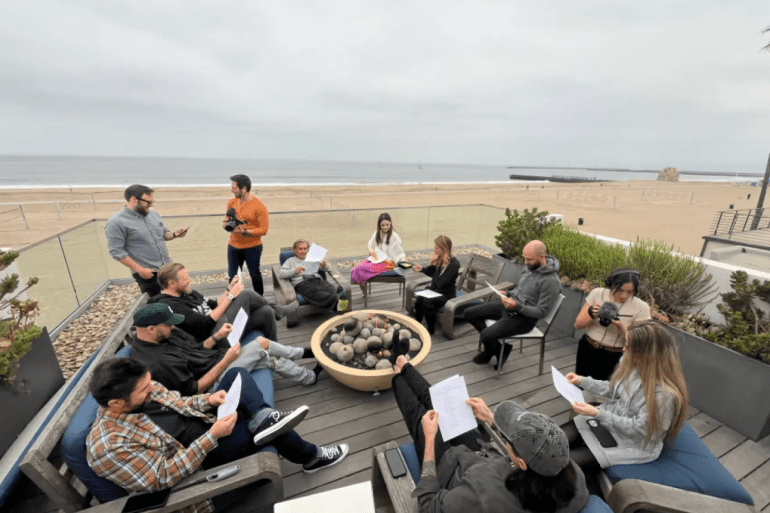- Cinema Synthetica contest challenges nine filmmakers to create AI-generated short films in 48 hours.
- Event part of AI on the Lot conference in Los Angeles, fostering collaboration between Hollywood and AI experts.
- Teams tasked with crafting shorts based on a dialogue-only script by Emmy Award-winning screenwriter Bernie Su.
- Films to be judged by industry insiders including Max Einhorn, Rachel Joy Victor, and others.
- Competition sponsored by Adobe, aiming to showcase latest AI software products.
Main AI News:
In a bold move at the intersection of technology and creativity, Todd Terrazas, Max Einhorn, Mike Gioia, and Ian Eck have initiated a challenge for nine emerging filmmakers: craft short films utilizing generative AI within a tight 48-hour window. This groundbreaking event, known as the Cinema Synthetica filmmaking competition, marks a pioneering endeavor aimed at showcasing the transformative potential of AI tools in shaping the landscape of filmmaking.
Scheduled as part of the upcoming AI on the Lot conference—a premier one-day summit slated to convene in downtown Los Angeles next week—the competition offers a platform for collaboration between Hollywood luminaries and trailblazers in artificial intelligence. Carefully curated, nine participants have been selected for the Cinema Synthetica challenge, subsequently organized into teams of three. Following an intensive two-day sprint, the resulting films will debut at AI on the Lot on May 16, where a distinguished panel of judges, including industry stalwarts like Einhorn, Jeff Clanagan, Kathleen McCaffrey, Momo Wang, Rachel Joy Victor, and Jackee Chang, will offer their appraisals.
Guided by a dialogue-only script penned by Emmy Award-winning screenwriter Bernie Su (“Artificial,” “The Lizzie Bennet Diaries”), each team is tasked with creating shorts spanning two to five minutes, all within a constrained budget of $500.
While the integration of AI into creative processes remains a subject of debate within the entertainment sphere, co-founder Einhorn underscores the role of generative AI as a catalyst for amplifying filmmakers’ artistic visions.
“Generative AI stands poised to revolutionize filmmaking, not as a replacement for human creativity, but as a tool for empowering storytellers,” Einhorn asserts. “Just as digital cameras and the Internet have democratized storytelling, the ‘Cinema Synthetica’ competition exemplifies how AI can further lower barriers to entry. It’s a testament to the notion that technological progress can enhance, rather than impede, the creative journey.”
Su echoes Einhorn’s sentiments, emphasizing the symbiotic relationship between AI tools and human ingenuity in the filmmaking process.
“As filmmakers harness the capabilities of AI alongside their innate talents, they will craft narratives that were previously unimaginable,” Su affirms. “Participating in this groundbreaking event is a privilege, as it signifies a paradigm shift in creative expression.”
Spearheaded by Adobe, the competition serves as a platform to showcase the latest advancements in AI software products.
“These artists epitomize innovation and will demonstrate the transformative potential of cutting-edge tools,” remarks Terrazas, executive producer, co-founder of Cinema Synthetica, and lead organizer of AI on the Lot.
Conclusion:
The Cinema Synthetica contest represents a pivotal moment where the convergence of AI technology and filmmaking creativity is showcased. By embracing generative AI tools, filmmakers are empowered to transcend traditional storytelling boundaries, ushering in a new era of innovation and accessibility in the market. This signifies a significant opportunity for both established players and emerging talent to explore novel avenues of expression and production efficiency.

